Ants are particularly active in the warm season, and if you have an ant problem, you might see several trying to nibble on your cat’s food.
While some cats might show no interest at all in them, others are going to play with them and even eat them.
Yes, cats can safely eat most types of ants.
Most ant species do not pose any health threat them except the fire ant.
Ants are rich in a variety of nutrients, including oleic acid, which is said to make cats ‘high’.
Read on to find out more!
Contents
Why Do Cats Eat Ants?
Not every cat might show a particular interest in ants.
However, most of those that do show any interest in them don’t actually want to eat them.
Eating ants is more common in indoor-only cats as they do not have the opportunity to practice their prey hunting abilities.
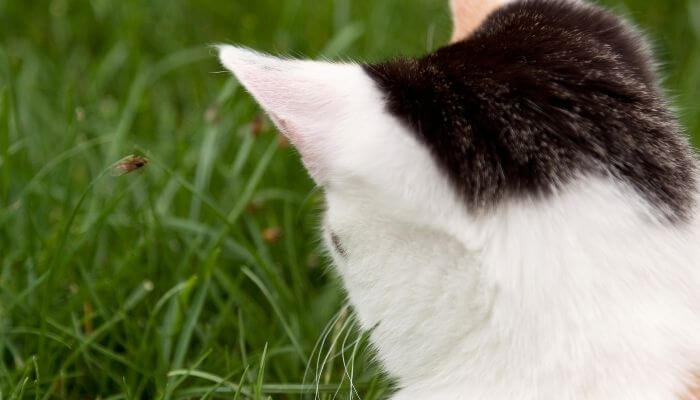
As such, they will look at ants as tiny prey that they can hunt down and play with and only after they’ve had enough of this activity will they eat them.
We don’t know for sure how ants taste to cats or if they actually like them.
But the most likely theory for which they eat them is that they stimulate their mind and their hunting instincts — not their hunger.
So should you be worried if your feline friend seems to have a penchant for eating ants?
Not really.
They’re just providing a means for entertainment, after all, and they’re not hurting your cat’s health.
What Nutrients Are In Ants?
One reason why ants can be quite nutritious (and recently we’ve seen that humanity is also considering using insects, in general, as a protein source) is that they are packed in a number of minerals and vitamins.
Ants are a great source of protein, iron, calcium, as well as zinc. They’re also rich in magnesium, phosphorus, and potassium.
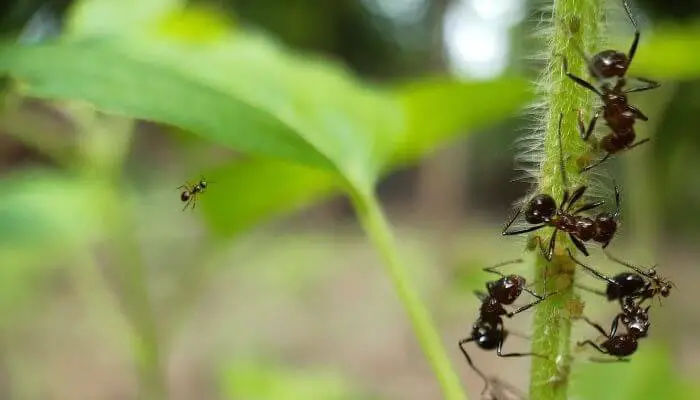
On top of that, ants are low in calories, not that this makes them a recommendable treat for cats that are obese or overweight.
Their protein and mineral content makes them great for kittens since their osteo-skeletal system is still developing.
On the other hand, most commercial kitten brands already offer your cat the nutrition she needs, so there is no need to supplement her diet with insects.
Are Ants Bad For Cats?
Most ant species are completely harmless, so they can be safely ingested by your cat without you having to worry about anything.
But there is an exception.
Red ants (also known as fire ants) are dangerous as they are quick to react to any type of aggression, so they will bite your pet.
Red ants actually inject a unique type of alkaloid into their victims.
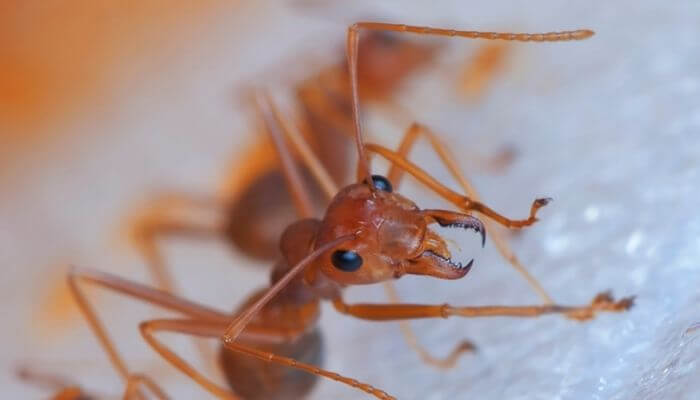
What does this mean for your cat?
Well, the bite site will definitely be affected, so your cat is going to have a blister or a local inflammation that will make that body region painful and sensitive to the touch for a period of at least several days.
Can A Red Ant Kill A Cat?
In most cases, no. The reason this answer is a bit vague is that there’s no way of knowing whether your feline buddy is allergic to ant bites or not.
However, if your pet was unlucky enough to bother a fire ant mound and there are hundreds of them biting her at the same time, this event could lead to her death.
Since most red ants tend to live outdoors, not indoors, we suggest using several natural alternatives to protect your garden and your cat from them.
Here are several examples:
- Cayenne pepper
- Lemon water
- Vinegar solution
- Dish soap
- Diatomaceous earth
- Peppermint, eucalyptus, or citrus oil
- Eco-friendly (or at least less toxic) insecticides such as neem oil
As you might have been able to tell, some of these solutions might actually work in convincing your cat that she needs to stay away from the ant mound, too — such as citrus oil, which cats hate from the bottom of their hearts.
In a nutshell, besides the fire ant, all other ant species cannot pose a threat to your cat’s health.
Borax, Ants, And Cats
It is very important that you avoid using Borax to kill ants if you have a cat.
Borax is commonly used for pest control, but it can be very dangerous for cats, especially if they ingest it or breathe it in.
Within two hours of coming in contact with Borax, cats can develop severe symptoms such as the following:
- Stomach pain
- Diarrhoea
- Vomiting
- Incessant thirst
If you think that your cat ate or breathed in Borax, get in touch with your veterinarian as soon as possible.
To avoid such mishaps, you can use bait stations in which you place Borax along with some food that attracts ants (such as bread, for example) and place them underneath your cabinets or on your walls — anywhere your cat cannot reach them.
How To Get Rid Of Ants When You Have A Cat
We’ve already mentioned some of the pest control solutions you can use to get rid of ants from your garden, but now it’s time to tackle the matter of removing them from your home.
It is quite likely that you are not going to have to handle a fire ant infestation in your house as they’re less prone to living in such environments.
However, regardless of their species, ants can be a pain since they can get into your cat’s food and nibble on your food, too.
Using liquid ant killers is not a good idea unless you purchase a pet-safe alternative.
Unfortunately, most of the synthetic varieties are toxic to animals, and you do not want to end up at the veterinary hospital with your cat suffering from a bad case of insecticide intoxication.
So liquids and sprays are not the best way of handling this problem.
But there is a type of product that can be extremely effective and that your cat will not show any interest in.
Ant killer granules are usually pet-safe for the simple reason that animals don’t mind them at all.
They might smell them for a bit, but after that, they’ll move on.
Some ant killer granules are, in fact, very smart as they contain sugar, so the ants are going to collect them and take them to their mounds, where they’ll affect the entire ant community.
How To Keep Ants Away From Your Cat’s Food
Well, if you do not want to decimate the ant population using insecticides or other means, there are two ways of preventing them from getting into your cat’s food.
You could invest in an ant-proof cat bowl or just keep your cat’s food in an airtight container.
Naturally, if you opt for the second solution, you will have to stop free-feeding your cat so as to avoid leaving any food remnants out. If you are fortunate enough to work from home, this can be a suitable option.
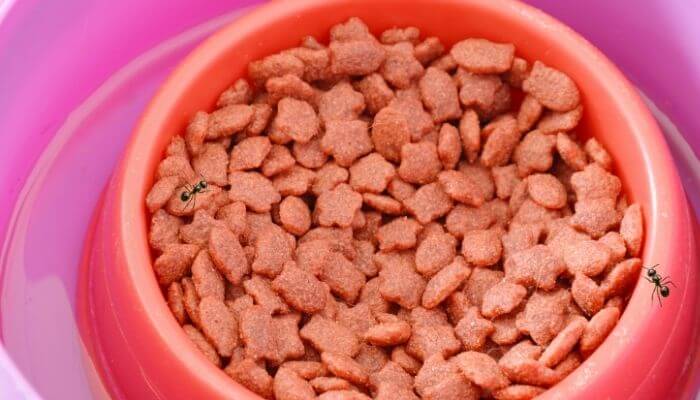
Free-feeding can be quite detrimental to some cats’ health as they lose their instincts and eat more than they should, which makes them prone to developing obesity.
Cleaning your cat’s bowl right after she has used it can be another way of going about things. Most cats don’t eat all of the wet food you give them anyway, and they lose interest in it during the day as it loses its scent and dries up.
Keep the feeding area as clean as possible and switch things up once in a while.
If the ant problem is in the kitchen, perhaps you should feed your cat in another room – at least for the time being.
Conclusion
Compared to other insects, ants are far less dangerous to cats.
However, the fire ant can cause severe allergic reactions in some cats, and if your feline friend swallows one and the bite occurs in her mouth or pharynx, she can actually suffocate.
Most other ant species are completely harmless, so there’s nothing to worry about if you see your cat eating ants.
But if your cat accidentally swallows a fire ant or is bitten by one, make sure to take your pet to the vet hospital as soon as possible. In intoxications, time is of the essence.
If you decide to get rid of ants in your home or in your garden, make sure to always use a pet-friendly insecticide or opt for a natural alternative such as essential oils, neem oil, vinegar and baking soda mixes, or cayenne pepper.
As an Amazon Associate I may earn a small fee from qualifying purchases at no extra cost to you. This helps us run the site, so thanks for your support!

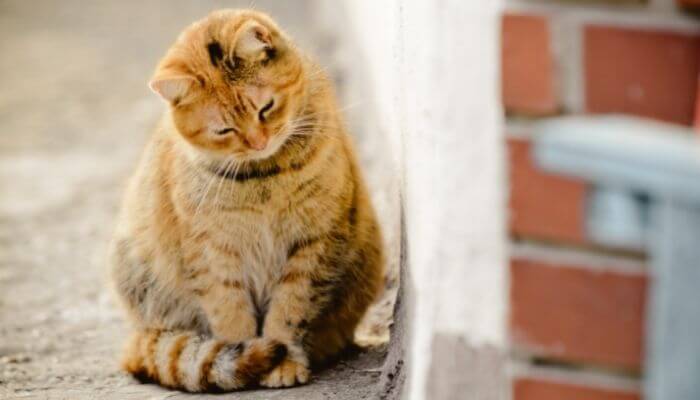
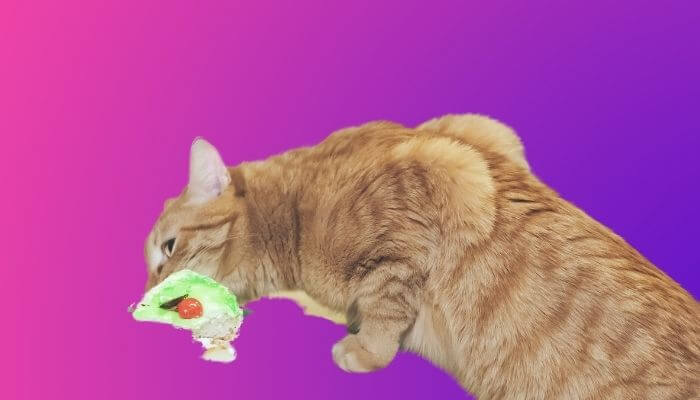
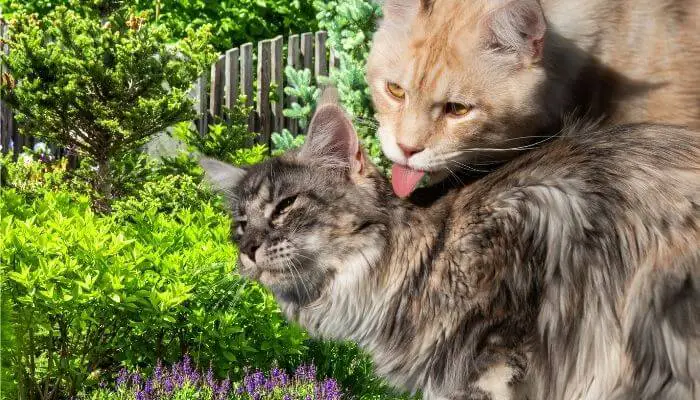
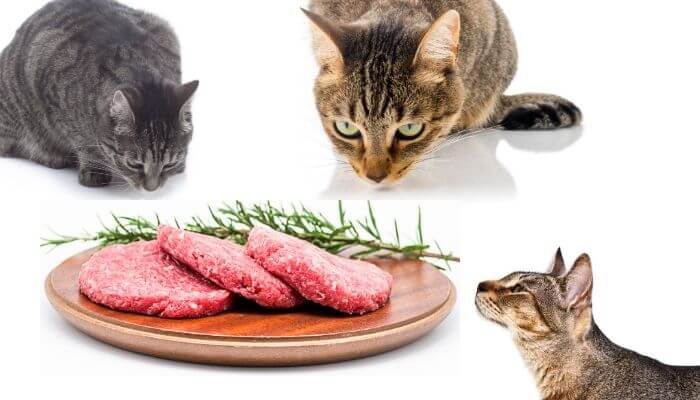
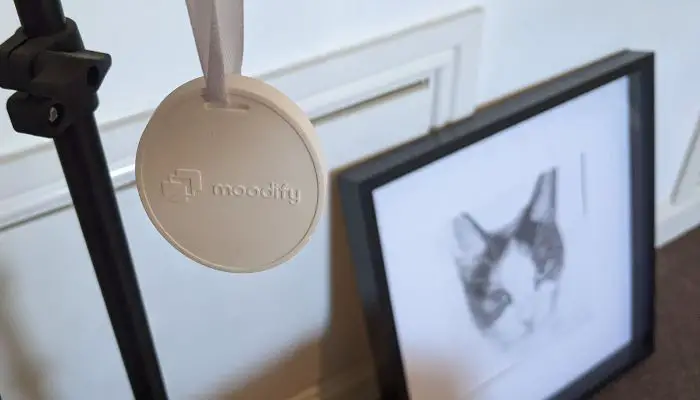
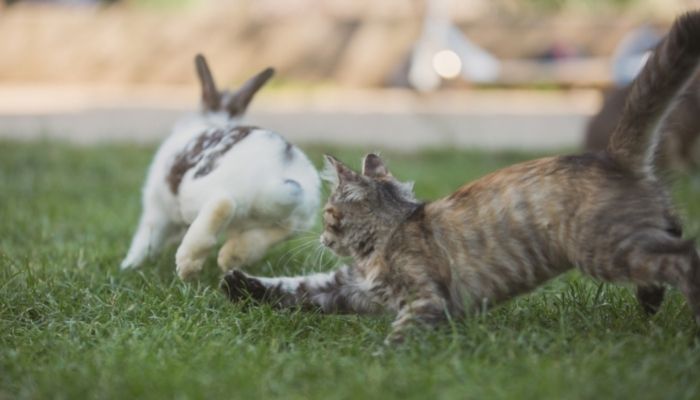

Leave a Comment